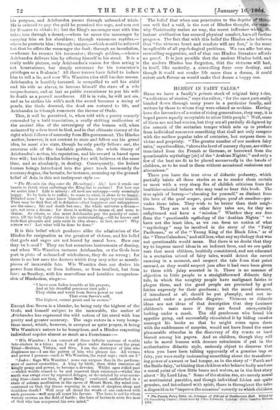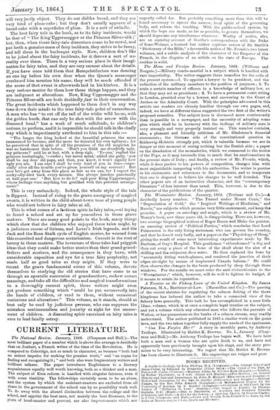HERESY IN FAIRY TALES.,
HERE we have a family's private stock of original fairy.tiles, "a collection of stories," says the editor, " for the most part orally handed down through many years in a particular family, and written by those to whom they were related as urchins. Having been the favourites of a series of rising generations, they may, it is hoped prove equally acceptable to other little people." Well, some of them arc not bad stories, but they are all partially disfigured by- the conceit of the sectarian temper which sets up to produce from individual resources something that shall not only compete with the mellow popular tales of centuries, but surpass them in virtue and propriety. "The greater number of our modern fairy tales," says the editor, "abovethe level of nursery rhyme, are either- translated from the French or German, or borrowed from the questionable mythoTogy [sic] of the "Arabian Nights ; " and only a few of the best are fit to be placed unreservedly in the-hands of children, or to be read to them without occasional omissions and alterations."
There you have the true virus of didactic pedantry, which partially taints all those stories so as to render them certain- to meet with a very sharp fire of childish criticism from the- healthier-minded infants who may read or hear, this book. The true spirit of heresy—" choosing for yourself," as distinct from the love of the quod semper, quod ubique, quod akomnibus—per- vades these tales. They wish to be better than their- neigh- bours. They are not as other fairy tales are, for they are- enlightened and have a "mission." Whether they are free- from the "questionable mythology of the 'Arabian Nights ' " we have not the least idea, as we can form no notion of what " mythology" may be involved in the story of the " Fairy Paribanou," or of the " Young King of the Black Isles," or of the " Three Calenders," and still less, what any mythology that was not questionable would mean. But there is no doubt that they try to impress moral ideas in an indirect- form, and we are quite sure that most children, healthily constituted, and not educated in a sectarian school of fairy tales, would detect the covert meaning in a moment, and suspect the tale from that point onward, as they would suspect jam after it had once been given to them with jalap secreted in it. There is no manner of objection in little people to a straightforward didactic fairy tale, in which the naughty people have malignant fairies to plague them, and the good people are protected by good fairies expressly for their goodness ; but the moral element, if introduced at all, should be put plumply, and not in- sinuated under a parabolic disguise. Virtuous or didactic ideas are not ideas of that description that they fascinate children's taste more if they are found unexpectedly lurking under a mask. The old gentleman who found his appetite going, and successfully stimulated it by hiding ratafias amongst his books so that he might come upon them with the suddenness of surprise, would not have found the same pleasurable stimulus in the discovery of dry crusts or hard biscuit among his papers. And so children, though they will take in moral lessons with demure submission - if put in the authoritative didactic style, seriously object 'to discover that when you have been talking apparently of a genuine imp or fairy, you were really insinuating something about the transform- ing power of a sweet or bad temper, as in the story of " Patch and the Smile-fairy," or hinting that children who behave badly are from a moral, point of view little bears and wolves, as in the first story about My Lord Lion." Some of the stories, too, are merely moral or sentimental parables, and though individual fairies are quite genuine, and introduced with spirit, there is throughout the tales a disposition to "improve the occasion" covertly to which children * The Family Fairy Tales; or, Glimpses of E012nd at Ileathersion Halt. Edited by Cholmondetey rennet, illustrated by Ellen Edwards. Loudon : John Camdeu Hotter. 1861.
will very justly object. They do not dislike bread, and they are very fond of plum-cake ; but they don't usually approve of a bread-cake with a superficies of plum. It is a sort of swindle.
The best fairy tale in the book, as to its fairy incidents, would be that of " The King Uggermugger or the Princess Silver-silk ;" but, then, when these fairy-tale dissenters cease to be moral, and put forth a genuine mass of fairy incidents, they strive to be funny, and tell them in the burlesque style. Now, children don't like to be joked about the fairy incidents, for it throws a sort of un-
reality over them. There is a very serious place in their imagi- nation for fairy tales, and they are very earnest about the details. If, you have once told them that Rumpelstilzchen was dancing on one leg before his own door when the Queen's messenger overheard him mention his name, they will be much offended if the scene of that event is afterwards laid in his kitchen. It is a very serious matter for them bow these things happen, and they are indignant at alterations. Now, King Uggermugger and the
Princess Silver-silk are both decidedly fast in their conversation. The great incidents which happened to them don't in any way
tone down their minds to the true fairy-tale point of earnestness. A man who has " to cut off the tail of the white wild horse, with the golden hoofs, that can only be shot with the arrow with the diamond head," has a work of much solicitude, to children's notions, to perform, and it is impossible he should talk in the chaffy way which is impertinently attributed to him in this tale :—
" The longer the king looked at the beautiful princess the more enamoured he became, and the more he detested his own ugliness ; for he perceived that in spite of all the promises of the old magician he was no handsomer than before. 'Don't you think me dreadfully ugly, my princess?' said he at last, with a deep sigh. Ye-yes,' replied the princess hesitatingly, 'r-rather; but never mind,' added she gaily, yen shall be my dear old papa, and then, you know, it won't signify how ugly you are. I am sure I shall be very fond of you in time—espe- cially after all the trouble you've given yourself on my account ! But now let's get away from this place as fast as we can, for I expect the cocky-olly-bird back every minute. She always lunches punctually at half-past one.' But how to do it?' said poor King Uggermugger, whose feelings were anything but gratified with this paternal arrange- ment."
This is very melancholy. Indeed, the whole style of the tale is flippant. Instead of rising to the grave emergency of magical events, it is written in the child-about-town tone of young people who would not believe in fairy tales at all.
This is what comes of a factious spirit in fairy tales,—of trying to found a school and set up for yourselves in these grave matters. There are many good points in the book, many things which show that the children who enjoyed these tales might, by a judicious course of Grimm, and Lover's Irish legends, and the Jack and the Bean Stalk cycle of English stories, be weaned from this conceited and dangerous sectarianism. Conceit is the root of heresy in these matters. The inventors of these tales had priggish ideas that they could make better stories than their grand-grand- fathers and mothers, and the consequence is they have, with considerable capacities and eye for a true fairy perplexity, not made half as good tales as they might. If they were to recant the grave fundamental errors of this volume, devote themselves to studying the old stories that have come to us through an apostolic succession of grandmothers, eschew covert meanings, and take all the difficulties and magical transformations in a thoroughly earnest spirit, these writers might even
yet produce something which " could be put unreservedly into the hands of children, or read to them, without occasional
omissions and alterations." This volume, as it stands, should at best only be used by judicious persons, who can suppress the mistaken sentimentalism and jocosity at sight for the amuse- ment of children. A dissenting spirit exercised on fairy tales is sure to lead fatally astray.































 Previous page
Previous page